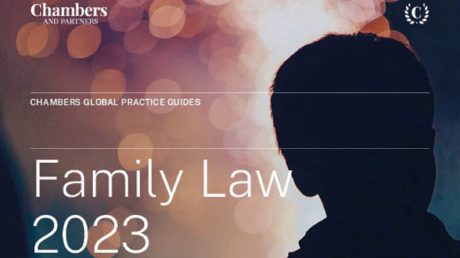Partners from our pre-eminent Divorce and Family practice have authored the introduction and England and Wales sections of the new Chambers and Partners Family Law practice area guide.
Head of Department Stephen Foster acts as Contributing Editor to the new guide, alongside Leeds partner Lisette Dupré. Stephen, Toby Atkinson, Debbie Chism and Carly Kinch are authors of the England & Wales section of the guide, an overview of family law and practice in the jurisdiction. Emma Hatley and Lucy Stewart-Gould author Trends and Developments, reviewing some of the key changes in the Family Court of late “where the winds of transparency, for so long a gentle breeze, have now reached gale force.”
The Chambers Family Law 2023 guide covers 19 jurisdictions. The guide provides the latest information on divorce jurisdiction requirements and processes, division of assets, spousal maintenance, prenuptial and postnuptial agreements, child custody and child support, ADR and key areas of reform and debate.
Our team was recognised as Family Law Team of the Year at the latest Chambers High Net Worth Awards. The 2022 edition of the Chambers High Net Worth guide quotes sources saying the team is “second to none for family law”.
The full practice guide is available to read on the Chambers and Partners website. Read on for the introduction to the global overview by Stephen and Lisette.
A global overview
“Globalisation” and the likely challenges it would bring to geopolitics, the movement of people, legislation, culture and trade have long been under the microscope. Whatever one’s view as to whether it is now slowing down, or even risks going into reverse, following the geopolitical fallout from Russia’s war in Ukraine, recent market turmoil and growing tensions between the US and China, we are unquestionably more connected than ever. We live in a world where one thinks nothing of a bank enquiry in Birmingham being handled in Bangalore or a Tik-Tok video gaining millions of “views” around the world in a matter of hours.
Indeed, in 2020, the tragic poster child of globalisation presented itself in the form of a deadly virus that had no regard whatsoever for distinguishing between borders, nations or cultures. In doing so, the world both expanded and contracted at the same time. Globalisation has had a huge impact on families everywhere and the law that governs them, making it essential for all family lawyers to keep abreast of the fast-changing landscape and view their cases through a wider international lens. This guide aims to assist those navigating this new world order.
By 2020, 281 million people were living outside their country of origin, carrying with them their own cultures, identities, domiciles and nationalities. Against this background, it is easy to see how intellectually narrow interpretations of family life and the legislation previously established to regulate it have required change. It is inevitable, therefore, that family lawyers recognise and acknowledge that competence in understanding the law in one jurisdiction alone is not sufficient: they must know how to be legally and culturally competent in other jurisdictions as well.
The purpose of this guide is to act as a tool for practitioners dealing with cross-border and international issues. It aims to look at the legislation, processes and trends shaping marriage, relationships, divorce, financial and children matters in key jurisdictions around the world. It is intended that, by using this guide, the reader will gain insight into the challenges and/or benefits other jurisdictions, separate from their home state, may offer.
In particular, the guide focuses on the specific issues that may arise in the context of a family, whether a carer/child or spousal/partner relationship. It considers the steps required to establish a marriage or partnership in a given jurisdiction and the ways in which that relationship can be terminated. By the end of 2023, 34 countries should recognise same-sex marriages, and more may recognise same-sex partnerships. Given these developments, each country has endeavoured to explain its legal position regarding same-sex relationships.
Read the full overview as part of the Chambers Family Law 2023 Practice Guide here.
You can find further information regarding our expertise, experience and team on our Divorce and Family pages.
If you require assistance from our team, please contact us or alternatively request a call back from one of our lawyers by submitting this form.
Subscribe – In order to receive our news straight to your inbox, subscribe here. Our newsletters are sent no more than once a month.












